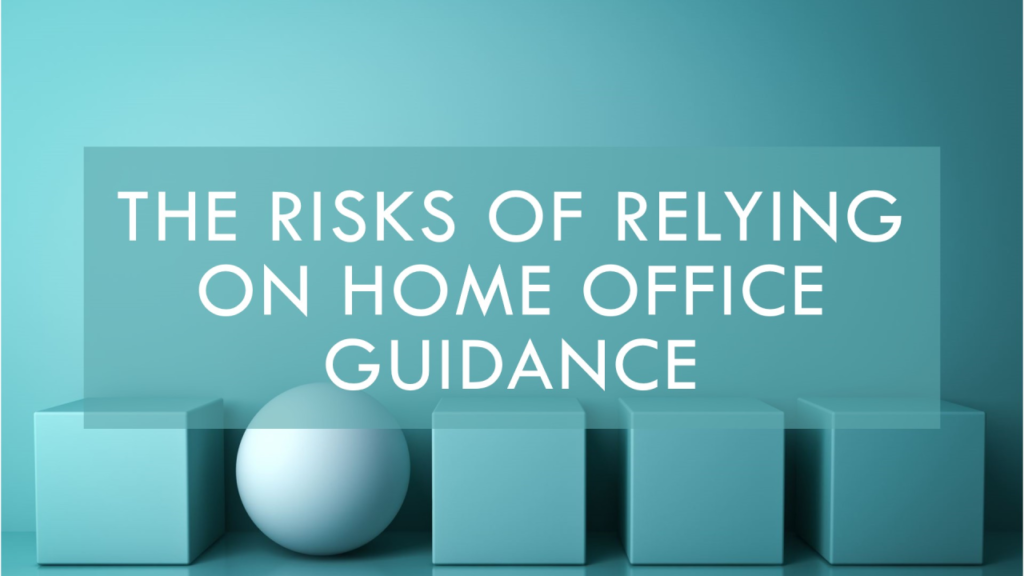-
Authorised and Regulated
by SRA, England and Wales
-
Proven track record in
sponsor license & visa applications
-
We are open Mon-Fri
9:00am to 6:00pm, 24/7 in emergency
Lessons from R (Andrews) v SSHD [2025]: The Risks of Relying Solely on Home Office Guidance

The High Court’s recent judgment in R (Andrews) v Secretary of State for the Home Department [2025] EWHC 64 (Admin), handed down on 17 January 2025, underscores the critical importance of adhering strictly to the Immigration Rules when navigating the UK immigration system. The judgment highlights that you cannot rely solely on Home Office guidance, which does not carry the same legal authority as statutory provisions or the Immigration Rules.
The Case in Brief
Ms. Andrews, an Indian national, entered the UK on 8 June 2023 with leave to remain as a Skilled Worker (Health Care). On 28 June 2023, Immigration Enforcement officers observed her at a convenience store in Andover, where she was serving customers behind the counter. Ms. Andrews contended that her actions were permitted as unpaid voluntary work under Home Office guidance for Skilled Worker visa holders. However, the Secretary of State determined that her activities breached the conditions of her leave to remain. As a result, her leave to remain was cancelled.
What Did the Court Decide?
The High Court dismissed Ms. Andrews’ claim for judicial review, holding that her actions breached the conditions of her leave to remain. The court made the following key observations:
1. Legal Hierarchy
The court reaffirmed the legal hierarchy governing immigration matters, stating:
“The hierarchy is statute, the rules and regulations, and then the guidance.”
This means that while Home Office guidance can be helpful, it cannot override or modify Immigration Rules or statutory provisions.
2. Definition of Voluntary Work
The Court clarified that voluntary work, as referred to in the guidance, must align with the definition in the Immigration Rules.
The Court observed:
“Ms Andrews was given leave to enter the UK on 8 June 2023 for the purpose of starting work as a care worker on 1 July 2023. She did not have permission to work in any other role. She accepts that when she was encountered by Immigration Enforcement on 28 June 2023 she was working. However, she contends that she was working in accordance with the Home Office Guidance for Skilled Workers in that while working in the Charlton Convenience Store she was carrying out voluntary work.
Within the Immigration Rules, the definitions provisions set out that “work” has the same meaning as “employment”, except that work does not include being party to an employment contract but not work. “Working illegally is working in breach of a condition of leave or working in the UK without valid leave where such leave is required.
“Voluntary work” is defined in the Immigration Rules as having the same meaning as applies to a voluntary worker in the National Minimum Wage Act 1988 (NMWA 1998). Section 44 of the NMWA 1998 provides, amongst other things:
“(1)A worker employed by a charity, a voluntary organisation, an associated fund-raising body or a statutory body does not qualify for the national minimum wage in respect of that employment if he receives, and under the terms of his employment (apart from this Act) is entitled to,—
(a) no monetary payments of any description, or no monetary payments except in respect of expenses—
(i) actually incurred in the performance of his duties; or
(ii) reasonably estimated as likely to be or to have been so incurred; and
(b) no benefits in kind of any description, or no benefits in kind other than the provision of some or all of his subsistence or of such accommodation as is reasonable in the circumstances of the employment.”
Consequently, to be a voluntary worker within the meaning given by section 44 of the NMWA 1998, an individual is not merely working for no remuneration. The worker has to be employed by a charity, voluntary organisation, an associated fund-raising body or a statutory body who is not entitled to any monetary payments of any description and no benefits in kind.”
3. Conflict Between Rules and Guidance
Ms. Andrews relied on Home Office guidance, which allowed skilled workers to undertake unpaid voluntary work. However, the court noted:
“Insofar as there is a conflict between the interpretation of the rules and regulation and guidance, the former takes precedence.”
The judgment highlighted that voluntary work must meet the specific criteria set out in the rules, including being undertaken for an organization such as a charity, voluntary organization, or statutory body. Ms. Andrews’ argument based on the guidance could not succeed because the guidance does not override the clear requirements of the rules.
Lessons from the Judgment
The Andrews’ case serves as a powerful reminder of the potential pitfalls of relying solely on Home Office guidance. Here are the key takeaways:
- Consult the Immigration Rules First: The Immigration Rules form the authoritative legal framework for visa compliance. Guidance can offer helpful insights but must always be cross-checked against the rules.
- Understand the Specific Criteria for Voluntary Work: Visa holders must ensure that unpaid work aligns with the legal definition of voluntary work. This means working for a qualifying organization, such as a charity or statutory body, and adhering to the conditions of their visa.
- Seek Professional Advice When in Doubt: Immigration law is complex, and even minor misunderstandings can lead to severe consequences, as seen in this case. Seeking advice from an immigration solicitor or regulated advisor can help prevent costly errors.
Conclusion
The judgment is a powerful reminder of the importance of strictly adhering to Immigration Rules. While Home Office guidance can offer useful clarification, it cannot justify actions that conflict with the rules or statutory provisions. For Ms. Andrews, reliance on ambiguous guidance and failure to align her actions with the rules ultimately led to the cancellation of her leave to remain. Her case underscores the need for careful interpretation of visa conditions and highlights the potentially serious consequences of non-compliance.
This decision reinforces the need for precision in immigration compliance and the importance of seeking professional advice to avoid unintended breaches of the law.
For more information, Contact us now.
Also:
Our founder, Sukhvinder Singh Nara, has launched a weekly LinkedIn newsletter dedicated to educating sponsor-licensed employers on compliance. Stay informed with valuable insights and practical advice on sponsor licence duties and compliance.
👉 Subscribe now to never miss an update and access expert knowledge

Get in touch with Nara Solicitors
Book a consultation with Nara Solicitors to get legal advise for your query.